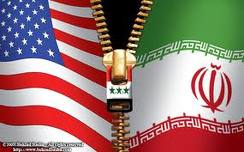Infantile Conservatism: America’s “Greatest National Security Threat is Iran.” Do Conservatives really Believe this?

Regularly now, The Washington Post, as always concerned with fairness and balance, runs a blog called “Right Turn: Jennifer Rubin’s Take From a Conservative Perspective.”
The blog tells us what the Post regards as conservatism.
On Monday, Rubin declared that America’s “greatest national security threat is Iran.” Do conservatives really believe this?
How is America, with thousands of strategic and tactical nuclear weapons, scores of warships in the Med, Persian Gulf, Arabian Sea and Indian Ocean, bombers and nuclear subs and land-based missiles able to strike and incinerate Iran within half an hour, threatened by Iran?
Iran has no missile that can reach us, no air force or navy that would survive the first days of war, no nuclear weapons, no bomb-grade uranium from which to build one. All of her nuclear facilities are under constant United Nations surveillance and inspection.
And if this Iran is the “greatest national security threat” faced by the world’s last superpower, why do Iran’s nearest neighbors — Turkey, Iraq, Azerbaijan, Afghanistan, Pakistan — seem so unafraid of her?
Citing The Associated Press and Times of Israel, Rubin warns us that “Iran has picked 16 new locations for nuclear plants.”
How many nuclear plants does Iran have now? One, Bushehr.
Begun by the Germans under the shah, Bushehr was taken over by the Russians in 1995, but not completed for 16 years, until 2011. In their dreams, the Iranians, their economy sinking under U.S. and U.N. sanctions, are going to throw up 16 nuclear plants.
Twice Rubin describes our situation today as “scary.”
Remarkable. Our uncles and fathers turned the Empire of the Sun and Third Reich into cinders in four years, and this generation is all wee-weed up over Mahmoud Ahmadinejad.
“For all intents and purposes, (Bibi) Netanyahu is now the West’s protector,” says Rubin. How so? Because Obama and Chuck Hagel seem to lack the testosterone “to execute a military strike on Iran.”
Yet, according to the Christian Science Monitor, Bibi first warned in 1992 that Iran was on course to get the bomb — in three to five years! And still no bomb.
And Bibi has since been prime minister twice. Why has our Lord Protector not manned up and dealt with Iran himself?
Answer: He wants us to do it — and us to take the consequences.
“With regard to Afghanistan, the president is pulling up stakes prematurely,” says Rubin.
As we are now in the 12th year of war in Afghanistan, and about to leave thousands of troops behind when we depart in 2014, what is she talking about?
“In Iraq, the absence of U.S. forces on the ground has ushered in a new round of sectarian violence and opened the door for Iran’s growing violence.”
Where to begin. Shia Iran has influence in Iraq because we invaded Iraq, dethroned Sunni Saddam, disbanded his Sunni-led army that had defeated Iran in an eight-year war and presided over the rise to power of the Iraqi Shia majority that now tilts to Iran.
Today’s Iraq is a direct consequence of our war, our invasion, our occupation. That’s our crowd in Baghdad, cozying up to Iran.
And the cost of that war to strip Iraq of weapons it did not have? Four thousand five hundred American dead, 35,000 wounded, $1 trillion and 100,000 Iraqi dead. Half a million widows and orphans. A centuries-old Christian community ravaged. And, yes, an Iraq tilting to Iran and descending into sectarian, civil and ethnic war. A disaster of epochal proportions.
But that disaster was not the doing of Barack Obama, but of people of the same semi-hysterical mindset as Ms. Rubin.
She writes that for the rest of Obama’s term, we “are going to have to rely on France, Israel, our superb (albeit underfunded) military and plain old luck to prevent national security catastrophes.”
Is she serious?
Is French Prime Minister Francois Hollande really one of the four pillars of U.S national security now? Is Israel our security blanket, or is it maybe the other way around? And if America spends as much on defense as all other nations combined, and is sheltered behind the world’s largest oceans, why should we Americans be as frightened as Rubin appears to be?
Undeniably we face challenges. A debt-deficit crisis that could sink our economy. Al-Qaida in the Maghreb, Africa, Arabia, Iraq and Syria. North Korea’s nukes. A clash between China and Japan that drags us in. An unstable Pakistan’s nuclear arsenal.
But does Iran, a Shia island in a Sunni sea, a Persian-dominated land where half the population is non-Persian, a country whose major exports, once we get past fossil fuels, are pistachio nuts, carpets and caviar, really pose the greatest national security threat to the world’s greatest nation?
We outlasted the evil empire of Lenin and Stalin that held captive a billion people for 45 years of Cold War, and we are frightened by a rickety theocracy ruled by an old ayatollah?
Rubin’s blog may be the Post’s idea of conservatism. Ronald Reagan wouldn’t recognize it.
Patrick J. Buchanan is the author of “Suicide of a Superpower: Will America Survive to 2025?” To find out more about Patrick Buchanan and read features by other Creators Syndicate writers and cartoonists, visit the Creators Syndicate webpage at www.creators.com .
This article was originally posted at Creators Syndicate

